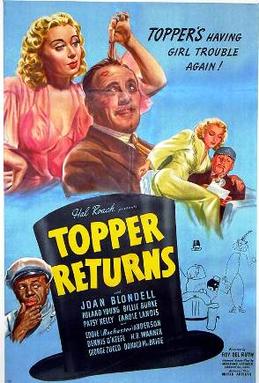Pages
▼
Saturday, April 15, 2017
Topper Returns (Roy Del Ruth, 1941)
This silly B-picture was just the thing to unwind with after the heaviness of the last couple of posts. It's the second of two sequels to the original Topper (Norman Z. McLeod, 1937), about a stuffy banker beset by sexy ghosts. But it doesn't have much in common with the first movie other than Roland Young as Topper and Billie Burke as his fluttery, suspicious wife who mistakes his odd behavior for infidelity when the ghosts start teasing him. Cary Grant and Constance Bennett were the mischievous ghosts in the first film, but Grant jumped ship before the first sequel, Topper Takes a Trip (McLeod, 1938), after which Bennett bailed out too. This time the sexy ghost is Joan Blondell, whose character, Gail Richards, is murdered by mistake: The intended victim was her friend, Ann Carrington (Carole Landis), heir to a large fortune. Once she passes over, the ectoplasmic Gail enlists Topper, of all people, in helping solve her murder. Young is, as always, a delight -- one of the greatest comic actors ever to be underemployed by Hollywood -- but he doesn't have a lot to do this time except be shoved around by the invisible Gail as they search for clues in the creepy mansion where she was murdered. Mrs. Topper shows up, too, accompanied by her maid (Patsy Kelly) and the chauffeur, played by Eddie Anderson, billed as Eddie "Rochester" Anderson because of his fame as the eponymous chauffeur on Jack Benny's radio show. Even though he's called "Eddie" by Topper and "Edward" by Mrs. Topper, he manages to slip in a line about how he wants his old job with Mr. Benny back. Although Anderson is given some stereotypical moments predicated on the old gag that black people are afraid of ghosts, and there's a tedious slapstick bit involving a sea lion (oh, don't ask), he's treated as more of a comic equal in the film than African American actors usually were, matching wisecrack for wisecrack. There are also some funny moments with Donald MacBride as a particularly addled police detective. The whole thing is laced through with topical gags that have lost their edge: Rafaela Ottiano plays a sinister housekeeper modeled on Mrs. Danvers in Rebecca (Alfred Hitchcock, 1940), and if you don't get the joke immediately be sure that someone will refer to her as "Rebecca," even though her character's name is Lillian. The movie is also a reminder of how pervasive radio once was in popular culture: In addition to Anderson's reference to Jack Benny, there are also quips about Orson Welles's "War of the Worlds" broadcast, and a radio giveaway show called "Pot o' Gold" in which people won the jackpot if they answered their randomly dialed telephone.
Charles Matthews
